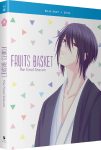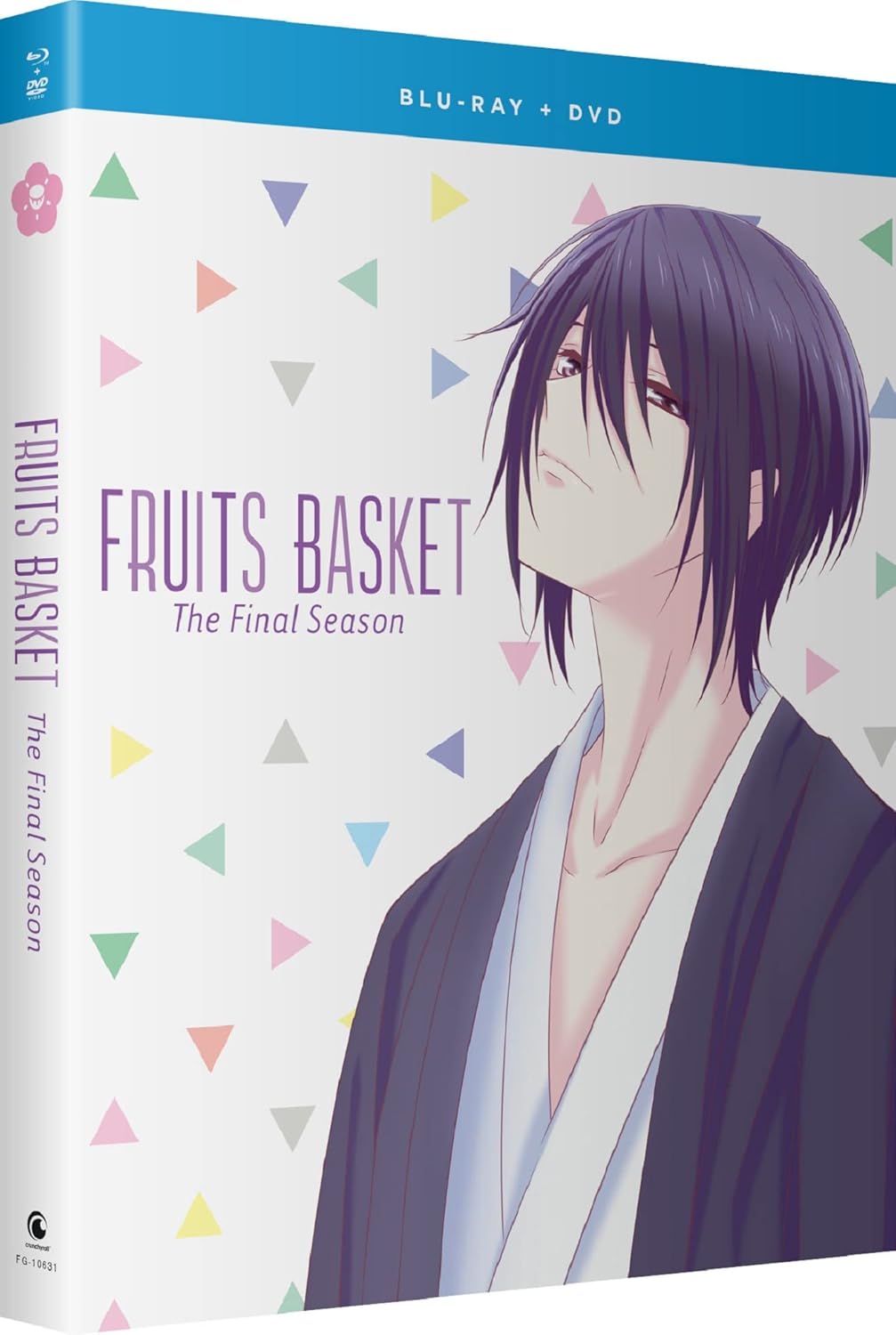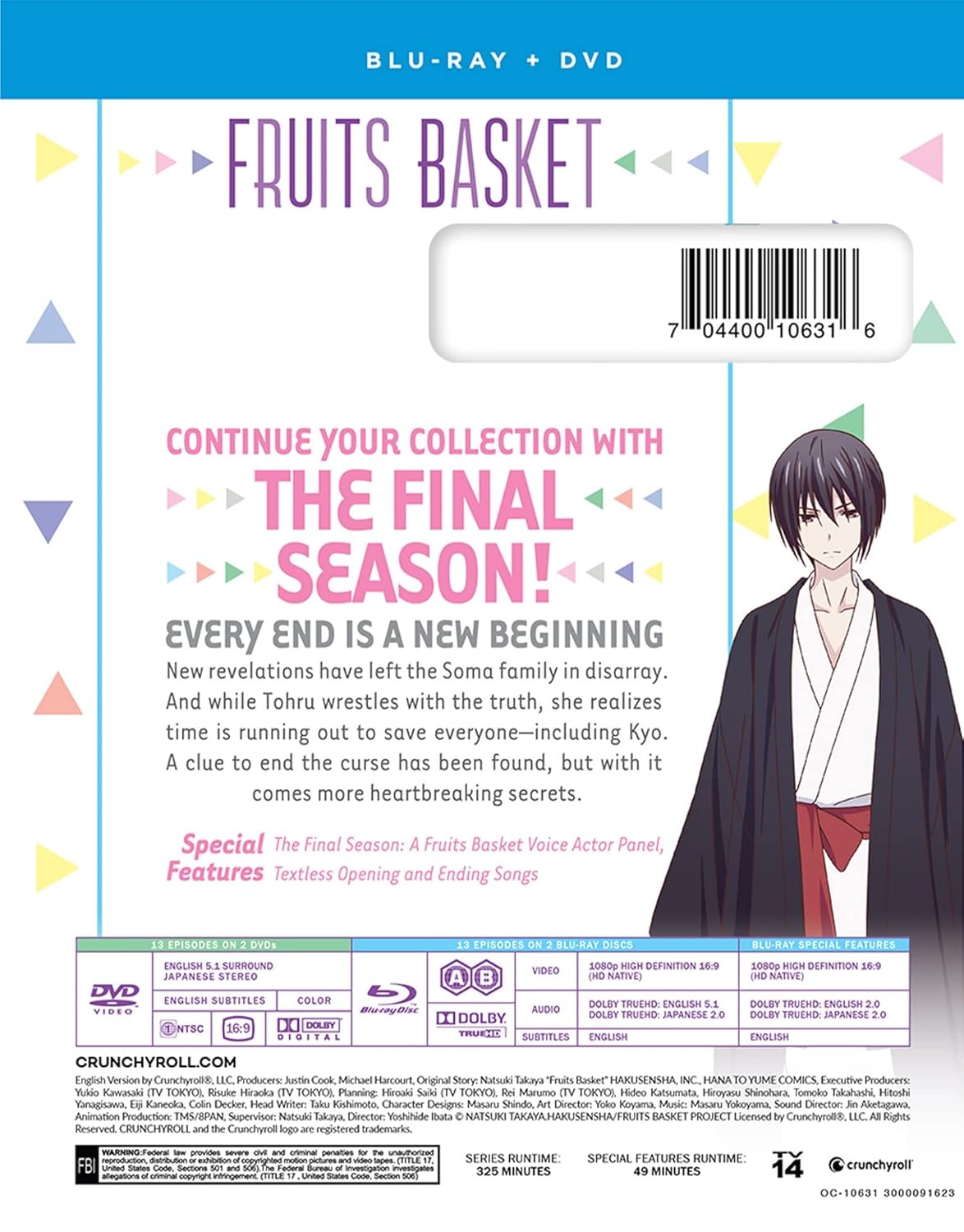
Fruits Basket: The Final Season – Review fruits basket Reading Guide – Oemiu
Fruits Basket: The Final Season – A Deep Dive and Reading Guide
Fruits Basket, a shojo manga masterpiece created by Natsuki Takaya, captured the hearts of millions with its poignant exploration of trauma, healing, and the power of found family. The original manga run concluded in 2006, followed by an initial anime adaptation in 2001. However, it was the 2019 reboot, “Fruits Basket,” that truly brought Takaya’s vision to life, meticulously adapting the entire storyline. The culmination of this adaptation, “Fruits Basket: The Final Season,” delivers a powerful and emotionally resonant conclusion to the series. More than just a shojo romance, Fruits Basket tackles difficult themes with sensitivity, making it a truly unforgettable experience. This article offers a detailed review of the final season, a reading guide to help newcomers, and an exploration of the enduring legacy of this beloved series, including resources for further exploration such as the Fruits Basket collector’s edition manga.
A Season of Confrontation and Catharsis: Reviewing The Final Season
The Final Season of Fruits Basket is a masterclass in emotional storytelling. It’s where all the carefully laid groundwork from the previous seasons pays off in spectacular fashion. The season primarily focuses on the unraveling of Akito Sohma’s twisted control over the Zodiac, revealing the origins of her trauma and the devastating impact it has had on her and everyone around her. We finally understand the depth of Akito’s suffering, born from a desperate need to hold onto the fleeting bonds of the Zodiac curse. Her actions, while reprehensible, are ultimately rooted in fear and loneliness. This doesn’t excuse her abuse, but it provides a vital context for understanding her character arc and eventual redemption.
One of the most compelling aspects of the final season is the exploration of the individual Zodiac members and their struggles to break free from the curse. Each character faces their personal demons, confronting the ways in which the curse has shaped their lives and relationships. From Kisa’s newfound strength and independence to Hiro’s maturation and empathy, we witness profound growth and healing. Yuki’s journey towards self-acceptance and his ability to forge genuine connections outside of the Zodiac is particularly heartwarming. Meanwhile, Kyo’s internal conflict regarding his true form and his worthiness of Tohru’s love reaches a fever pitch, leading to some of the most emotionally charged moments of the entire series. The animation quality remains consistently high, with beautifully rendered character designs and expressive animation that amplifies the emotional impact of each scene. The soundtrack is equally evocative, perfectly complementing the mood and atmosphere of the series.
The central theme of breaking free from cycles of abuse and trauma is handled with remarkable nuance. The series doesn’t shy away from depicting the complexities of these issues, portraying the long and arduous process of healing. It emphasizes the importance of self-forgiveness, empathy, and the power of human connection in overcoming adversity. The relationship between Tohru and Akito becomes a pivotal point, highlighting Tohru’s unwavering compassion and her belief in Akito’s potential for change. This season isn’t just about resolving the curse; it’s about creating a path towards a brighter future for everyone involved. The Fruits Basket manga holds a special place in the hearts of many for it’s delicate handling of difficult themes.
Navigating the World of Fruits Basket: A Reading Guide
For newcomers eager to experience the world of Fruits Basket, knowing where to start and how to navigate the extensive storyline is crucial. While the anime adaptation (2019-2021) is a faithful and visually stunning representation of the manga, the source material offers an even deeper and more nuanced experience. Here’s a breakdown to guide you through:
- The Manga (Original Run): This is the core of the Fruits Basket universe. The original manga consists of 23 volumes, released between 1998 and 2006. It provides the most comprehensive and detailed account of the story, including subtle nuances and character interactions that may be condensed or omitted in the anime adaptation.
- Fruits Basket Collector’s Edition: For those looking for a premium reading experience, the Fruits Basket Collector’s Edition is highly recommended. These volumes feature larger pages, new cover art by Natsuki Takaya, and bonus content, making them a beautiful addition to any manga collection.
- Fruits Basket Anime (2001): While charming in its own right, the 2001 anime adaptation only covers a portion of the storyline and deviates significantly from the manga in later episodes. It can be enjoyed as a separate entity but is not a substitute for the full manga or the 2019 reboot.
- Fruits Basket Anime (2019-2021): This reboot is a faithful and complete adaptation of the entire Fruits Basket manga storyline. It’s an excellent starting point for newcomers, offering a visually stunning and emotionally resonant experience.
- Fruits Basket: Prelude: This is a prequel movie that focuses on the backstory of Tohru’s parents, Kyoko and Katsuya Honda. It provides valuable context and emotional depth to Tohru’s character and her motivations. It’s best watched after completing the main series.
- Fruits Basket Another: This is a sequel manga series that follows the next generation of students at Kaibara High School, featuring the children of the original characters. While not essential to understanding the main story, it offers a glimpse into the future and provides closure for fans who want to see what happened to their favorite characters.
When deciding where to begin, consider your personal preferences. If you prefer reading, the manga is the definitive experience. If you prefer watching anime, the 2019 reboot is the ideal starting point. “Fruits Basket: Prelude” can be viewed after either format, and “Fruits Basket Another” offers extra content for dedicated fans. Regardless of your chosen format, prepare to be emotionally invested in the characters and their journeys. Fruits Basket is a story that will stay with you long after you finish reading or watching it.
The Enduring Legacy: Exploring the Themes of Fruits Basket
Fruits Basket’s enduring popularity lies not only in its captivating storyline and charming characters but also in its profound exploration of universal themes that resonate with readers and viewers of all ages. At its core, the series is a story about trauma and healing. Each of the Zodiac members carries their own burdens, shaped by the curse and Akito’s manipulative control. The series delves into the psychological effects of abuse, neglect, and isolation, depicting the long and arduous process of recovery. It acknowledges that healing is not a linear journey but rather a complex process with setbacks and moments of doubt. The importance of seeking help, building supportive relationships, and practicing self-compassion are recurring motifs throughout the series.
Found family is another central theme in Fruits Basket. Tohru’s arrival at the Sohma household creates a sense of belonging and connection that many of the Zodiac members have never experienced before. She provides a safe and nurturing environment where they can open up about their struggles and support each other’s growth. The series emphasizes the importance of chosen families and the power of human connection to heal emotional wounds. It demonstrates that family is not always defined by blood but rather by love, acceptance, and mutual support. The theme of empathy also takes center stage as Tohru constantly sees the good in people, even those who have hurt her or others. Her unwavering compassion allows her to connect with Akito and other characters on a deeper level, helping them to confront their own darkness and find a path towards healing. The series encourages viewers and readers to cultivate empathy and understanding, recognizing that everyone is fighting their own battles.
| Theme | Description | Examples in the Series |
|---|---|---|
| Trauma and Healing | Exploring the psychological effects of abuse and the process of recovery. | Akito’s abusive behavior and her own traumatic past; Kyo’s struggle with his true form; Yuki’s feelings of inadequacy. |
| Found Family | The importance of chosen families and the power of human connection. | Tohru’s relationship with the Sohma family; the Zodiac members supporting each other; Tohru’s friends, Saki and Arisa. |
| Empathy and Compassion | The ability to understand and share the feelings of others, leading to forgiveness and healing. | Tohru’s unwavering belief in Akito’s potential for change; her ability to connect with the Zodiac members on a deeper level; her willingness to forgive those who have wronged her. |
Finally, Fruits Basket champions the idea that everyone deserves a second chance. Even characters who have committed terrible acts, like Akito, are given the opportunity to atone for their mistakes and find redemption. The series emphasizes the importance of forgiveness, both of oneself and of others, in breaking free from cycles of negativity. It suggests that even the most broken individuals are capable of change and that hope is always possible. It’s these deeply human and universally relatable themes that solidify the series as more than a standard shojo manga; it becomes a compelling examination of the human condition and a testament to the resilience of the human spirit, making it a worthwhile and timeless read. For those looking for the complete collection, the Fruits Basket complete manga set is a great option.
Character Evolution: A Study in Growth
One of the most rewarding aspects of Fruits Basket is witnessing the remarkable character development throughout the series. Each character undergoes significant transformations, grappling with their inner demons and evolving into more well-rounded and self-aware individuals. Tohru Honda, the optimistic and kind-hearted protagonist, begins as a seemingly naive and selfless girl. However, as the series progresses, we see her develop a stronger sense of self and a greater understanding of her own needs and desires. She learns to set boundaries, confront her own insecurities, and stand up for what she believes in. Tohru’s growth is subtle but profound, transforming her from a passive observer into an active agent in her own life and the lives of those around her.
Kyo Sohma, the hot-headed and perpetually angry cat of the Zodiac, experiences perhaps the most dramatic transformation. Initially consumed by self-loathing and resentment, he gradually learns to confront his past traumas and accept his true form. Through his relationship with Tohru, he discovers the capacity for love, forgiveness, and self-acceptance. Kyo’s journey is a testament to the power of human connection to heal even the deepest wounds. Yuki Sohma, the seemingly perfect and aloof rat of the Zodiac, struggles with feelings of inadequacy and a desperate desire to connect with others. Throughout the series, he confronts his own insecurities, learns to trust others, and forges genuine relationships outside of the Zodiac circle. Yuki’s transformation is a journey of self-discovery, as he sheds his idealized image and embraces his true self.
Akito Sohma, the enigmatic and abusive head of the Zodiac, undergoes the most complex and controversial transformation. Initially presented as a villainous figure, the series gradually reveals the origins of her trauma and the devastating impact it has had on her life. While her actions are never excused, the series offers a nuanced understanding of her character and her motivations. Akito’s eventual redemption is a testament to the power of empathy and forgiveness, suggesting that even the most broken individuals are capable of change. Her journey is a reminder that healing is possible, even after years of suffering and abuse. The careful crafting and development of these characters and their relationships contribute significantly to the series’ overall emotional impact and enduring appeal. Seeing these characters overcome adversity and find happiness and connection makes the viewing experience that much more rewarding.
Frequently Asked Questions
What is Fruits Basket about?
Fruits Basket tells the story of Tohru Honda, an orphaned high school student who stumbles upon the secret of the Sohma family: they are possessed by the spirits of the Chinese Zodiac animals, and transform into their respective animal forms when hugged by someone of the opposite sex (excluding other Zodiac members) or when they are under great stress. Tohru, despite her own hardships, is relentlessly kind and optimistic. She moves in with Shigure Sohma, and later with Yuki and Kyo, and her presence gradually helps them confront their individual traumas and break free from the curse of the Zodiac. The series delves into themes of trauma, healing, found family, and empathy, making it more than just a typical shojo manga.
What is the order to watch/read Fruits Basket?
For the most complete experience, the ideal order is: first, watch the Fruits Basket anime reboot (2019-2021), covering the entire manga storyline. Alternatively, you can read the Fruits Basket manga first, either the original volumes or the collector’s editions. After that, watch the “Fruits Basket: Prelude” movie, which provides the backstory of Tohru’s parents. Finally, if you are interested in seeing what happens after the main series, you can read the sequel manga, “Fruits Basket Another”. This order ensures you experience the core story first, then delve into the supplemental materials to enhance your understanding and appreciation of the Fruits Basket universe.
Is Fruits Basket worth watching/reading?
Absolutely! Fruits Basket is widely regarded as a masterpiece of the shojo genre, and for good reason. It’s a deeply emotional and thought-provoking story that explores complex themes with sensitivity and nuance. The characters are well-developed and relatable, and their journeys of healing and self-discovery are both inspiring and heartbreaking. Whether you choose to watch the anime or read the manga, you’re in for a truly unforgettable experience that will stay with you long after you finish it. While the premise might seem lighthearted at first glance, Fruits Basket deals with mature themes that resonate with people of all ages.
How does the 2019 anime differ from the 2001 anime?
The key difference is completeness and faithfulness to the source material. The 2001 anime adaptation only covered a portion of the manga storyline and deviated significantly in later episodes. The 2019 anime reboot, on the other hand, is a faithful and complete adaptation of the entire Fruits Basket manga. This means it includes all the major plot points, character arcs, and themes from the original manga, without any significant deviations. The animation quality and character designs are also significantly improved in the 2019 version, making it a more visually appealing and emotionally impactful experience.
What is the Zodiac curse in Fruits Basket?
The Zodiac curse is the central conflict in Fruits Basket. Thirteen members of the Sohma family are possessed by the spirits of the Chinese Zodiac animals (rat, ox, tiger, rabbit, dragon, snake, horse, sheep, monkey, rooster, dog, and boar), plus the cat, which was excluded from the Zodiac in the original legend. When these individuals are hugged by someone of the opposite sex (excluding other Zodiac members) or under extreme stress, they transform into their respective animal forms. This curse causes them a great deal of emotional and psychological distress, as it isolates them from others and prevents them from living normal lives. The curse is also tied to Akito Sohma, who believes that their purpose is to maintain the bond between the Zodiac members and herself.
Who is Akito Sohma and why is she so important?
Akito Sohma is the head of the Sohma family and a central antagonist in Fruits Basket. Akito believes she is the “god” of the Zodiac and exerts control over the other Zodiac members. She has an unhealthy attachment to maintaining the Zodiac bond. Her character is complex. While her actions are often cruel and abusive, the story reveals the roots of her behavior lie in her own trauma and insecurity. Ultimately, Akito undergoes significant character development and strives towards redemption. The story wouldn’t have the emotional depth and compelling narrative it has without her character.
What is “Fruits Basket Another” about?
“Fruits Basket Another” is a sequel manga series to the original Fruits Basket. It follows the next generation of students at Kaibara High School, focusing on a new protagonist named Sawa Mitoma. Sawa is a socially awkward and introverted girl who befriends the children of the original characters. The series explores themes of identity, belonging, and finding one’s place in the world. While not essential to understanding the main Fruits Basket storyline, “Fruits Basket Another” offers a glimpse into the future and provides closure for fans who want to see what happened to their favorite characters and their families. The sequel manga maintains the emotional depth and character-driven storytelling of the original series, while also introducing fresh perspectives and new challenges for the next generation.


Price: $64.98 - $48.73
(as of Sep 07, 2025 02:35:33 UTC – Details)




